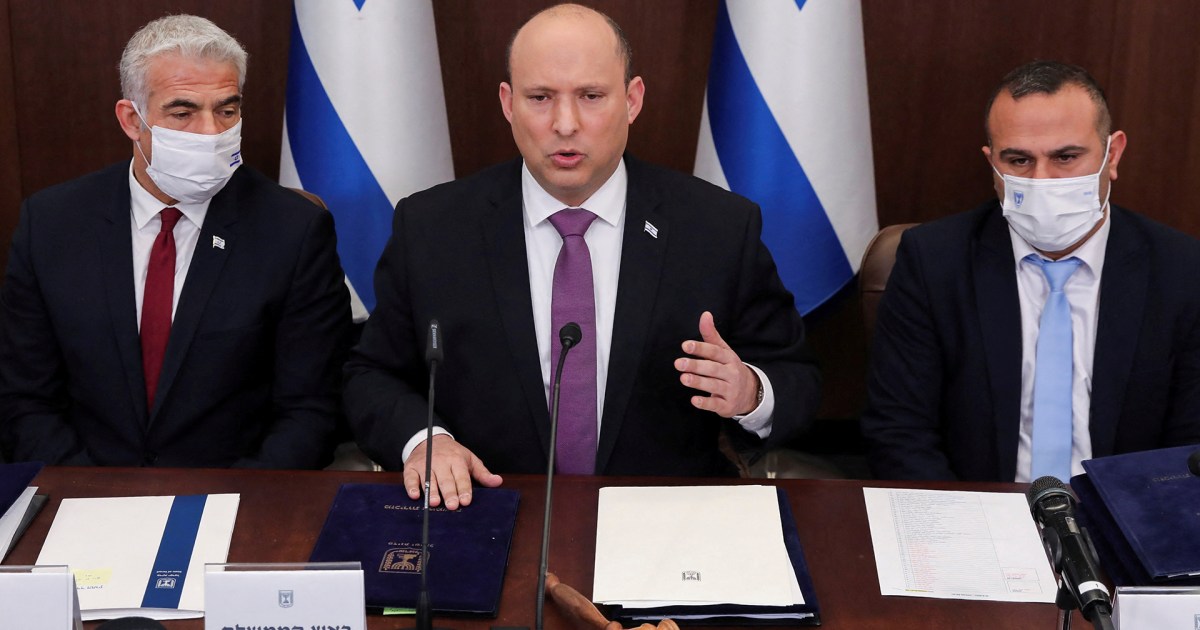Al-Jazeera correspondent reported that the Israeli government headed by Naftali Bennett evaded two votes of no-confidence in the Knesset, despite losing the parliamentary majority.
The Knesset opened its summer session today, Monday, amid expectations of the collapse of the ruling coalition, which lost the parliamentary majority after Yamina MP Idith Suleiman announced her withdrawal from the coalition last month.
Next Wednesday, the Israeli opposition is expected to present a bill to dissolve the Knesset and early general elections, if it finds a majority in support of the bill.
The United Arab List (Ra'am) led by Mansour Abbas has not yet decided its position on continuing to support the government, or voting against it, which keeps the door ajar on several possibilities in the coming days.
The United List party announced last April that it was freezing its membership in the coalition, in protest of the tensions at the Temple Mount, and said at the time that the decision to freeze would be valid until the end of the current Knesset recess.
According to the Israeli Broadcasting Corporation, in light of the political crisis in the Israeli government, Prime Minister Naftali Bennett met yesterday evening with the heads of the government coalition blocs to assure them of the heavy responsibility entrusted to them.
He said that holding elections at this stage would lead to chaos.
The Likud parties, headed by former Prime Minister Benjamin Netanyahu, the right-wing religious Shas party and the right-wing religious United Torah Judaism party, submitted motions of no-confidence, and these proposals came under several headings, namely "the government's failure to manage the Iranian nuclear threat, the climate crisis and the cost of living" presented by Likud, and the second entitled “The government’s failure in every field: economic, civil, political and security” was presented by Shas and United Torah Judaism.
The Israeli Broadcasting Corporation stated that the Likud party is studying the possibility of submitting a bill on Wednesday to dissolve the Knesset, and in order to pass the proposal in an initial reading, a simple majority is sufficient, unlike other readings, which require a majority of 61 Knesset members. The hesitation stems from the fact that if the bill fails to vote, it will not be possible to bring it up again for 6 months.
In this context, Joint List Chairman Ayman Odeh said in an interview with Radio Nass, "We will vote in favor of dissolving the Knesset on Wednesday if the bill is proposed and there is a reasonable chance of it being passed."
It is noteworthy that the Israeli Knesset includes 120 seats, divided equally between the government and the opposition.
Bennett's government was sworn in in June last year, ending a long-running political crisis in Israel and leading to four general elections in two years.
The government coalition consists of 8 parties from different colors of the political spectrum, including the participation of an Arab party, the United List, for the first time.
For his part, Foreign Minister and leader of the “There is a Future” party, Yair Lapid, acknowledged that the government’s lack of a majority “creates difficulties,” adding in a speech to his party members that “there were similar governments in Israel that lasted for a long time.”

